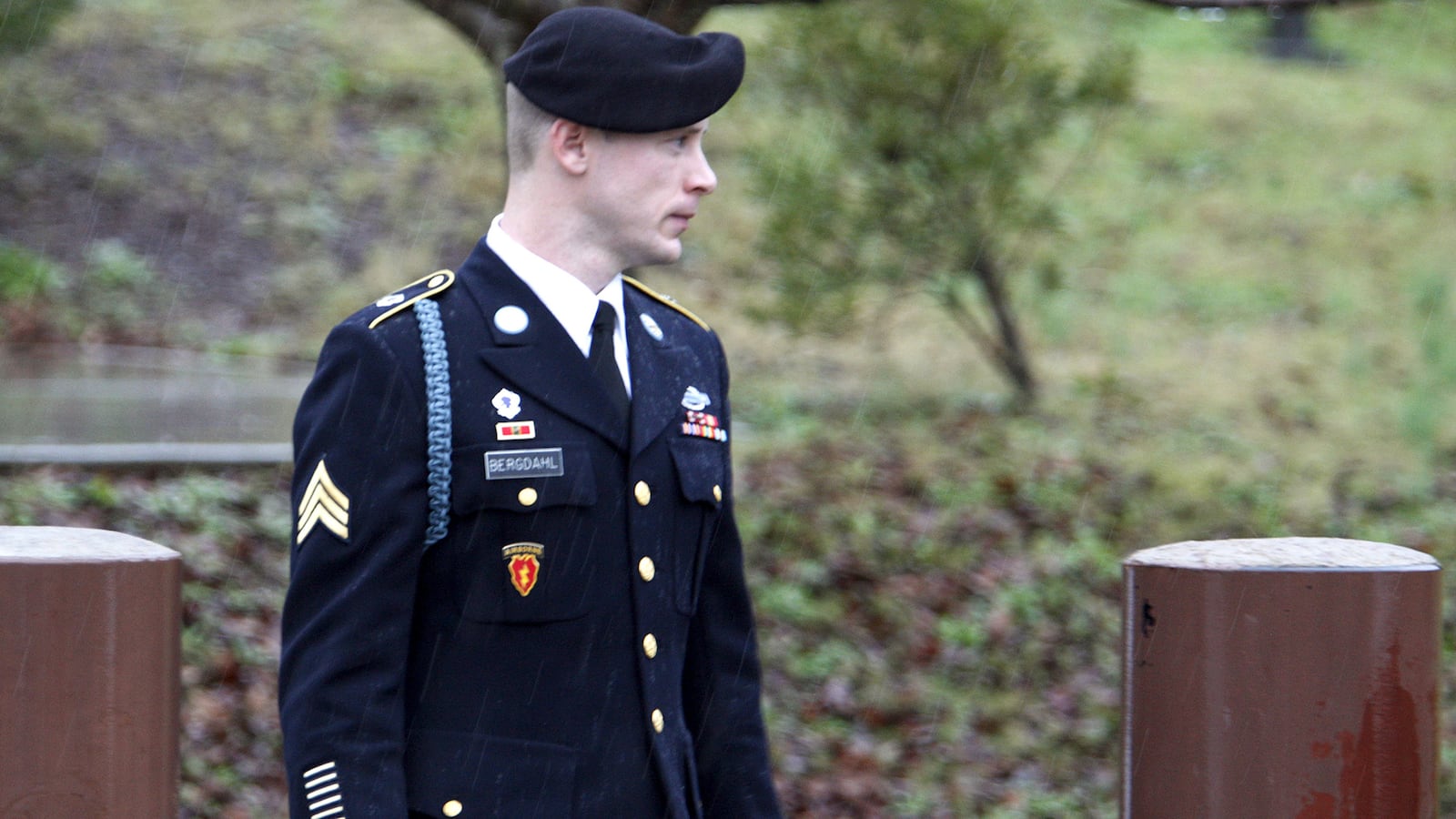When Army Sgt. Bowe Bergdahl left Observation Post Mest in Paktika province in 2009, the Afghan War stopped.
The U.S. Army had a DUSTWUN—“duty status whereabouts unknown”—for the first time in recent memory. A soldier was missing and had to be found. Operations were canceled as every American in the country focused on Bergdahl’s rescue.
“One person’s bad decision shut down a fucking war zone,” said Bryan Myers, a former Special Forces soldier who now runs the World is My Country Foundation, which focuses on humanitarian assistance in disaster zones.
Myers watched from the operations center as special operations forces shifted to searching for Bergdahl.
“When they say, the entire military is coming for you, they aren’t lying,” he said. “We had one purpose only. Get the American back.”
But the search had ramifications. Two Army National Guard members and a Navy SEAL were severely injured on rescues missions.
Almost eight years later, the mystery of what happened to Bergdahl is solved, but the consequence of his decision to desert is still pending. On Monday, the U.S. Army will begin a sentencing hearing on Fort Bragg, North Carolina, to determine his punishment.
The Daily Beast talked to several soldiers, including a former Army lawyer, in advance of the hearing about how they’d punish Bergdahl. The consensus was Bergdahl deserved jail time because he committed a mortal sin in the eyes of the armed forces. He willfully left his post in violation of the Army’s first general order:
“I will guard everything within the limits of my post and quit my post only when properly relieved.”
But it goes deeper than that, going to the heart of why troops keep fighting. Forget God and country in a war zone. Troops carry on for the man or woman next to them. That is why Bergdahl was never going to go unpunished. But that is also why when he disappeared—even as deserter—the Army came looking for him.
DUSTWUN
Bergdahl was captured by Taliban fighters soon after leaving OP Mest, but was held by the Haqqani terrorist network, Taliban-aligned militants in Pakistan. He said last week he didn’t want to put his fellow soldiers at risk or derail operations.
“I didn’t think there’d be any reason to pull off a crucial mission to look for one guy,” he said.
When Bergdahl disappeared, the Haqqani network was the target of a special operations task force in 2009. His disappearance derailed several years’ worth of missions aimed at dismantling the network, said a former special operations commander familiar with the task force’s missions.
“He fucked everything up when he walked off base,” the special operations commander said, speaking on condition of anonymity because he wasn’t authorized to talk about the case. “He caused us to shift focus massively.”
Retired Senior Chief James Hatch’s femur was shattered on one rescue mission when his SEAL team raided a compound where Bergdahl was suspected of being held.
“Somebody’s going to get killed looking for this kid—killed or hurt,” Hatch said during an interview with CNN’s Anderson Cooper.
He added, “The goal is to get the kid. He was an American, and he had a mom. And I didn’t want his mom to see him get his head chopped off on YouTube, you know what I mean?”
Hatch testified during a pretrial hearing and will likely return to the stand for the sentencing phase.
As part of the search, the special operations commander saw the investigation into Bergdahl’s disappearance, including things Bergdahl wrote about his deployment to Afghanistan. It was clear to the special operations commander Bergdahl didn’t desert so he could report “critical problems” in his chain of command, as he claimed at Monday’s guilty plea.
“His intent was to confront the Taliban because he felt the Army wasn’t doing it,” the commander said.
Bergdahl admitted in an interview with Hollywood screenwriter and Mark Boal that he saw himself as a “Jason Bourne-like character.”
“I had this fantastic idea that I was going to prove to the world that, you know, I was the real thing,” he said on the Serial podcast. “I was trying to prove to the world, to anybody who used to know me, that I was capable of, you know, being that person.”
After five years in captivity, Bergdahl was eventually swapped for five detainees at Guantanamo Bay. For a fleeting moment, he was greeted as a hero. But when his unit mates started to speak out, the narrative changed. During the 2016 presidential campaign, Donald Trump called Bergdahl a traitor and said he “should be shot.”
Life in Prison
There was no pre-trial agreement prior to Bergdahl’s guilty plea. (That’s known as a “naked plea” in legal jargon.) It means Bergdahl’s punishment is up to Army Col. Jeffery R. Nance, the judge overseeing the case.
“He was going to be found guilty based on the facts,” said Eric Carpenter, an assistant law professor at Florida International University and a former Army helicopter pilot-turned-attorney.
Bergdahl faces life in prison.
Monday’s pre-sentencing hearing is unique to military courts-martial. To an outsider, the hearing will resemble a trial with witnesses and evidence, Carpenter said.
“This is the real fight,” Carpenter said. “Both sides are going to be fighting it out pretty hard. Maybe the defense team has picked up something, but I think it’s really risky.”
Carpenter said if he was going to guess, Bergdahl gets a year in prison and a bad conduct or dishonorable discharge.
“I’d swap out the time he was held by the Taliban,” Carpenter said. “He behaved appropriately when he was under Taliban control. I would give him credit for the time he spent there.”
Bergdahl has described being beaten and chained to a bed and locked in a cage after several escape attempts.
“He paid a hard price for those five years,” the special operations commander said. “He made amends with his guilty plea, but he needs to go to prison in the U.S.”
Myers initially said Bergdahl should go to prison, but later said if he was the judge, he would dishonorably discharge him and strip him of his rank and pay.
“It’s way more complex than just looking at the law book,” he said. “Inshallah (God willing), I will never understand what he went through.”
Bergdahl’s mental health could be a factor, Carpenter said.
“He thought he was doing something good for the people in his unit,” Carpenter said. “The only way you can understand that is if you have significant mental health problems.”
An Army psychiatrist determined in July 2015 Bergdahl was suffering from a schizotypal personality disorder—a failure to understand the impact of their behavior on others—in Afghanistan. But the psychiatrist, Col. Christopher L. Lange, also noted Bergdahl understood the “wrongfulness of his conduct” when he deserted.
Myers said Bergdahl’s chain of command should shoulder the blame for not doing more to help him. He remembered how a Special Forces team shunned a teammate who admitted to suffering from PTSD.
“We’re not equipment,” he said. “Sixteen years of battle. No one ever prepared us for this. Suicide awareness is a slideshow that nobody watches.”
The Army does a horrible job of paying attention to soldiers because of the military’s “mission first” mindset, Myers said.
“We’re not some fucking machine that goes out to combat,” Myers said. “There has to be some humanity. It wasn’t like [Bergdahl] was the star quarterback one day and then this happened. The Patriots coming back to win the Super Bowl was more surprising than Bowe Bergdahl walking off that compound.”





